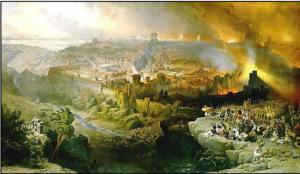Abstract Religious Thoughts
November 10, 2010 § 5 Comments
This is a response to Abstract Thoughts, who was kind enough to answer my questions. Thank you so much Sara for taking the time to write a thoughtful response about such an important subject. No need to apologize, I hope you had a great weekend! 🙂
I would define religion as any belief or set of beliefs that dictate how an individual lives their life, (particularly beliefs concerning the subjects about which I asked). If you think about your answers to those questions in relation to your consistent behavior, you will notice they dictate what actions you take and avoid, in addition to determining the very questions you are willing to ask/possibilities you are willing to consider. Your answers to those questions are your most foundational presuppositions, they determine your worldview, and your worldview rules your life.
Dictionary.com offers this definition:
re·li·gion–noun
1. a set of beliefs concerning the cause, nature, and purpose of the universe, esp. when considered as the creation of a superhuman agency or agencies, usually involving devotional and ritual observances, and often containing a moral code governing the conduct of human affairs.
2. a specific fundamental set of beliefs and practices generally agreed upon by a number of persons or sects: the Christian religion; the Buddhist religion.
3. the body of persons adhering to a particular set of beliefs and practices: a world council of religions.
4. the life or state of a monk, nun, etc.: to enter religion.
5. the practice of religious beliefs; ritual observance of faith.
6. something one believes in and follows devotedly; a point or matter of ethics or conscience: to make a religion of fighting prejudice.
7. religions, Archaic . religious rites.
8. Archaic . strict faithfulness; devotion: a religion to one’s vow.
You have met the requirements of the first definition, however, when it goes on to say religions are “usually involving” devotional and ritual observances, that is a prejudicial opinion. I disagree completely, every Atheist and Agnostic has such a set of beliefs and thus falls within the purview of their definition of religious, regardless of what they suggest is “usually involved”. Their mention of a governing moral code is also present in the Atheist and Agnostic communities.
Definitions 2, and 3 also fully encompass the Atheist and Agnostic communities, (in general practice there is no difference between the two communities). Having identified yourself as an Agnostic I would like to offer you this index of articles: Atheism, agnosticism and humanism: godless religions — Questions and Answers. If you have a few moments just to read the titles of the articles, they are instructive.
I would also like to offer this excerpt from the Baker Encyclopedia of Christian Apologetics for your consideration:
While it wasn’t recognized until after the fact, one of the most precise predictions in Scripture gives the very year in which the Christ would die. Daniel was speaking of both the exile of Israel and the atonement for sin when he recorded a prayer of confession for the sins of his people (9:4–19) and a vision in response in which the angel Gabriel gave to Daniel the following foresight (9:24–26):
Seventy “sevens” are decreed for your people and your holy city to finish transgression, to put an end to sin, to atone for wickedness, to bring in everlasting righteousness, to seal up vision and prophecy and to anoint the most holy. Know and understand this: From the issuing of the decree to restore and rebuild Jerusalem until the Anointed One [Messiah], the ruler, comes, there will be seven “sevens,” and sixty-two “sevens.” . . . After the sixty-two “sevens,” the Anointed One will be cut off.
The context indicates that Daniel knew he was speaking of years, since he was meditating on the “number of years” that God had revealed to Jeremiah that Jerusalem would lay waste, namely, “seventy years” (vs. 2). God then told Daniel that it would be 7 x 70 (years) before the Messiah would come and be cut off (die).
Artaxerxes ordered Nehemiah “to restore and rebuild Jerusalem” (Dan. 9:25; cf. Nehemiah 2) in 445/444 b.c. From that year, rather than the earlier date when Cyrus approved only the rebuilding of the temple (Ezra 1:3), Daniel predicted that it would be 483 years to the time of Christ’s death. Taking the widely accepted date of 33 for the crucifixion (see Hoehner), would be 483 years exactly:
Seven sevens plus sixty-two sevens is 69 x 7 = 483
444 + 33 = 477
Add six years to compensate for the five days in a solar year not in the lunar year followed by Israel (5 x 477 = 2385 days or 6+ years).
477 + 6 = 483 years
Geisler, Norman L.: Baker Encyclopedia of Christian Apologetics. Grand Rapids, Mich. : Baker Books, 1999 (Baker Reference Library), S. 612
This listing contains only some of the many prophecies of the Messiah to be found in the Hebrew Bible.
Lastly, I would like to share two lectures with you. The first by Dr. William Lane Craig, (one of the greatest living philosophers), and the second by Dr. Greg L. Bahnsen (one of the greatest deceased philosophers).
Dr. Craig’s lecture is titled Do All Roads Lead To God? It covers a variety of issues, but one that is extraordinarily significant for people considering Christianity is “What about people who die without hearing of Jesus?” Dr. Craig answers this question, and I would love to hear your response regarding the ethics of his answer. My question is, do you consider the God of the Bible ethically perfect in His dealings with humanity, concerning the subjects addressed in the lecture? And secondly, do you consider the God of the Bible ethically perfect in His dealings with humanity, concerning any other subject not addressed in the lecture?
Dr. Bahnsen’s lecture is titled The Myth of Neutrality. Dr. Bahnsen actually did a series of five lectures explaining worldviews of which this is the first, and they would be very helpful to you in understanding religion, particularly since I mentioned worldviews in our conversation. Dr. Bahnsen was considered “The man Atheists fear most,” while he was alive, he was a legendary debater. His lectures are the first five posted on the site this one is from.
These two lectures are from a website I set up to answer people’s questions about Christianity, and show them the reasons that can be offered in favor of Christianity. Theology, philosophy, history, science, psychology, sociology, politics, and comparative religion are considered. You will notice several links along the right side of the site, could I ask you to please read the title of each one? I ask this because I know long lists of links can cause a viewer’s eyes to glaze over, but I assure you each one is significant. I hope you see some things that pique your interest, and return from time to time for reflection.
You have been extremely gracious with me so far in your willingness to have this conversation and answer the questions I posed. If you would be so kind as to watch these lectures also, and share your thoughts, I would be greatly appreciative. 🙂 No hurry, I’m sure you have many pressing contenders for your time.

